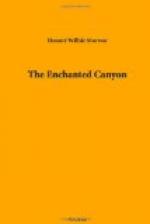Enoch had dreamed of Diana, and now, the reins drooping limply from his hands, he gave his mind over to thought of her. There was no one on earth whom he desired to see so much or so little as Diana! No one else to whom in his trouble his whole heart and mind turned with such unutterable longing or such iron determination never to see again. He had no intention of searching for her in the desert. He knew that her work would keep her in the Grand Canyon country. He knew that it would be easy to avoid her. And, in spite of the fact that every fiber of his being yearned for her, he had not the slightest desire to see her! She would, he knew, see the Brown story. No matter what her father may have told her, the newspaper story, with its vile innuendoes concerning his adult life, must sicken her. There was one peak of shame which Enoch refused to achieve. He would not submit himself either to Diana’s pity or to her scorn. But there was, he was finding, a peculiar solace in merely traveling in Diana’s desert. He had complete faith that here he would find something of the sweet philosophy that had written itself in Diana’s face.
For Enoch had not come to middle life without learning that on a man’s philosophy rests his ultimate chance for happiness, or if not for happiness, content. He knew that until he had sorted and separated from each other the things that mattered and the things that did not matter, he must be the restless plaything of circumstance. In his younger days he had been able to persuade himself that if his point of view on his life work were right and sane, nothing else could hurt him too much. But now, easing himself to the pony’s gentle trot and staring into the exquisite blue silence of the desert night, he told himself that he had been a coward, and that his cowardice had made him shun the only real experience of life.
Public service? Yes, it had been right for him to make that his life work. And such service from such men as himself he knew to be the only vital necessity in a nation’s life. But the one vital necessity in a man’s spiritual life he had missed. If he had had this, he told himself, life’s bludgeons, however searching, however devastating, he could have laughed at. A man must have the thought of some good woman’s love to sustain him. But for Enoch, the thought of any woman’s love, Luigi had tainted at its source. He had neither mother nor mate, and until he had evolved some philosophy which would reconcile him to doing without both, his days must be feverish and at the mercy of the mob.
Pablo broke into a canter and Enoch roused himself to observe a glow of fire far ahead on the trail. His first impulse was to pull the horse in. He did not want either to be identified or to mingle with human beings. Then he smiled ruefully as he recalled the poverty of his outfit and he gave Pablo his way again. In a short time Pablo had reached a spring at a little distance from the fire. As the horse buried his nose in the water, a man came up. Enoch judged by the long hair that he was an Indian.




